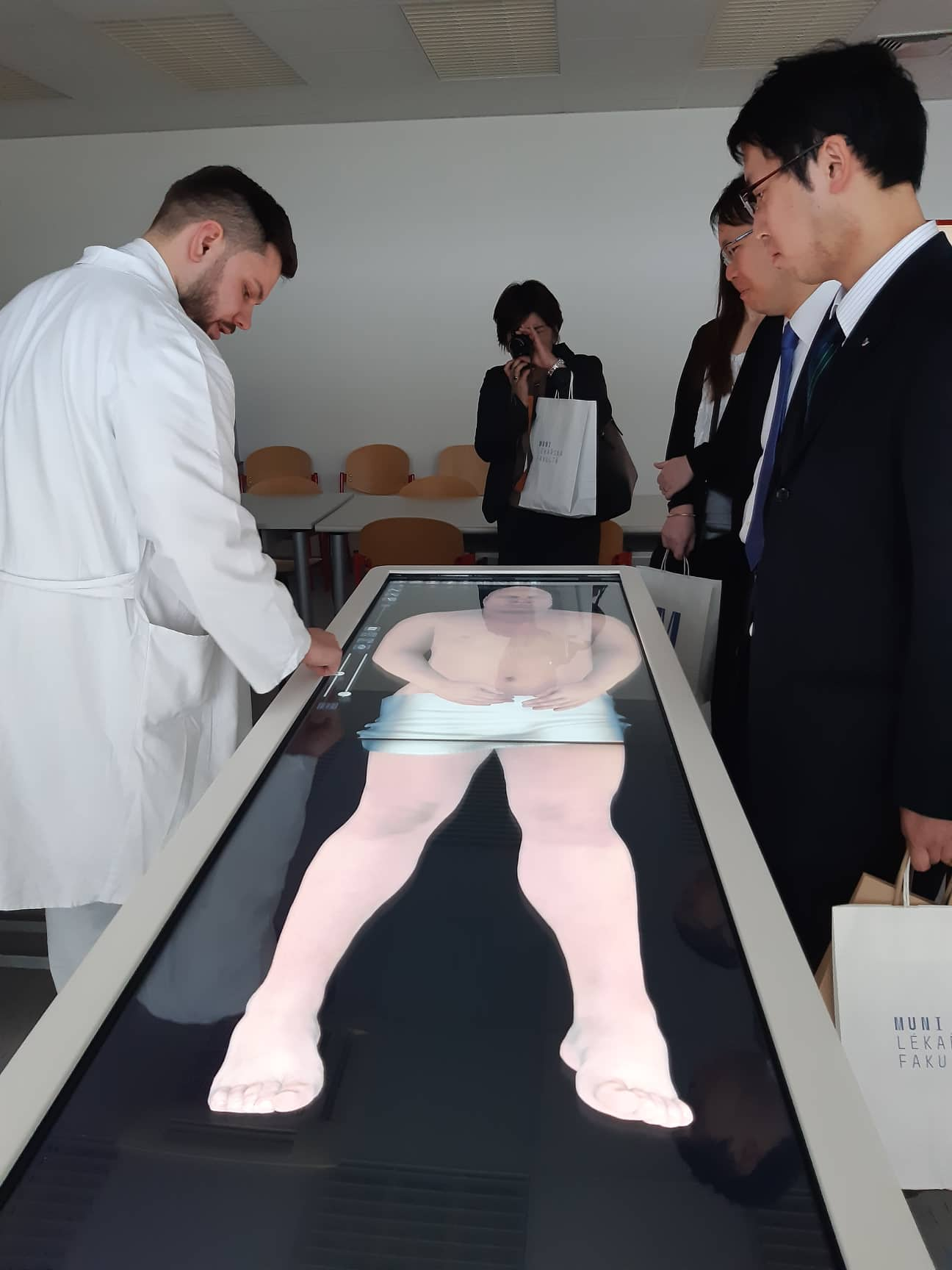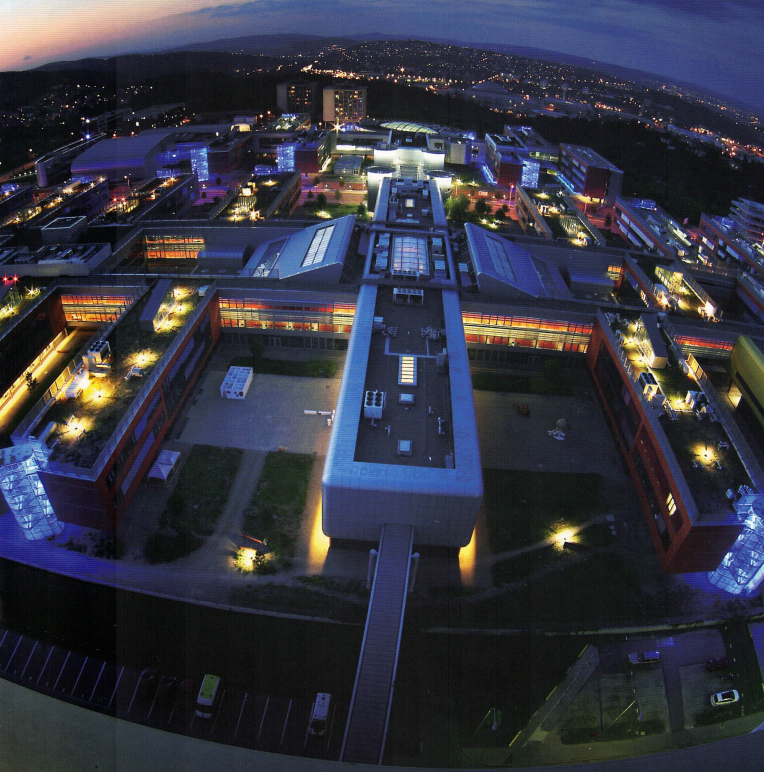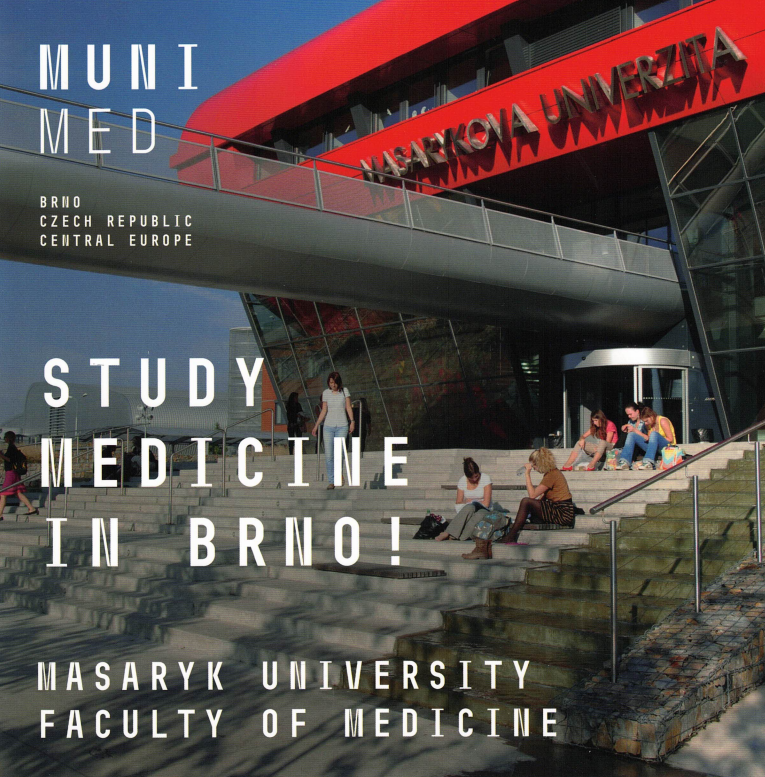MASARYK UNIVERSITET I BRNO - TSJEKKIA
Faculty of Medicine and Dentistry in Brno
|
General medicine: 6 -year program (General medicine) 5-year program (Dentistry)
Degree Awarded: MUDr (Medicinæ universæ doctor) - M.D. Doctor of General Medicine
Admission Requirements: Secondary School Certificate, a good command of English
Entrance Exams: multiple choice tests in Chemistry, Biology, Mathematics or Physics Tuition fee: CZK 380,000 per year (ca 182.000 NOK) for General medicine
Tuition fee: CZK 400,000 per year (ca 192.000 NOK) for Dentistry
Admission fee: paid within the enrollment date by admitted students only
Living Expenses: approximately € 800 per month
|
 Why Study at the Faculty of Medicine of Masaryk University?
Why Study at the Faculty of Medicine of Masaryk University?
- Excellent Conditions for Study in the Newly Built Campus
The new campus offers a modern environment with the latest audiovisual equipment. A library with a large reading room and smaller, more intimate reading rooms is the heart of the campus. The users of the library have multidisciplinary and specialized resources at their disposal. http://ofm.ukb.muni.cz/kampus-virtual-tour/VP_Kampus.html
Located in the immediate vicinity of the campus, a shopping and catering centre enhances student life and studies at the Faculty of Medicine.
- The Information System of Masaryk University, known under the acronym of IS, is recognized as World Class! Virtually paper-free, the IS informs and saves valuable time. Everything you need is at your disposal with just a click of a mouse.

 Information System MU provides a large-scale electronic support for managing school- and study-related data (for further information, see Study and Examination Regulations of Masaryk University) and offers a wide range of administrative, E-learning: https://is.muni.cz/obchod/fakulta/med/preparatory/?lang=en, and communication tools.
Information System MU provides a large-scale electronic support for managing school- and study-related data (for further information, see Study and Examination Regulations of Masaryk University) and offers a wide range of administrative, E-learning: https://is.muni.cz/obchod/fakulta/med/preparatory/?lang=en, and communication tools.
The history of IS MU goes back to 1999 when Faculty of Informatics, Masaryk University, started its development. The System, which is currently used by more than 30.000 users a day visiting more than 2.500.000 pages, hosts several hundred applications some of which allow students to easily manage their inter-faculty studies, create their own study plans, and schedule their credit-winning activities. It facilitates the students' operations in that it guides them the way that ensures they follow all the rules related to their studies and study plans. After being put into operation, the Information System of Masaryk University succeeded in removing queues from Offices for Studies (since the students can currently, for instance, enroll in terms and courses electronically), disposing of a lot of paperwork and making a lot of study-related acts easier. - Top-Ranking Teachers Committed to Their work

- A High Level of Science and Prospects for Research and Development
Masaryk University is an important scientific institution whose employees work on a great deal of medical, biomedical and biological top-level research projects. Students may get involved in research projects from their first year of study.

- Construction of the International Clinical Research Centre in Brno (ICRC) is open on the premises of St. Anne’s Faculty Hospital. This multifunctional medical technological park will create a platform for the Czech Republic to be engaged in international research and development projects.

- Possibility of Studying Abroad
The Faculty of Medicine is a school much sought after by international students who have the possibility of studying here in the English language. Our students have the opportunity to participate in academic experiences abroad, as early as their second year of study. Also, at the Faculty of Medicine there is a active recognized student organization (IFMSI - International Federation of Medical Students Association), which arranges for vacationing student scientific and clinical practice both inside and outside the Czech Republic. Medical students in their 4th and 5th years of study have practiced in Austria and Germany, thanks to IFMSI organization. Currently there are over 130 positions available for students to practice at international venues.
- Recognized Prestige of Masaryk University Both Home and Worldwide

Norwegian med student: Brno is my second home
27 December 2016

Photograph: Zbyněk Maděryč

While the Norwegian system may be a bit more modern and the classes more focused on problem solving, Czech teachers give more in-depth information, so we learn more.
Simen Brekke first heard about Masaryk University from Norwegian students who studied medicine in Brno. They were happy with their studies and recommended the university to others. This was one of the reasons why the Norwegian student decided to change his home city of Oslo for Brno for six years. “Time flies really fast here,” says the 25-year-old med student, who is now in his fourth year of studies at the Faculty of Medicine.
The first three years of study proved more difficult for him, as they were more theory-oriented. As Brekke describes, “We had a lot of chemistry, biology, biochemistry, and other theoretical classes. But this year we have already started our training in hospitals around Brno. Every two weeks, we rotate between different departments, such as surgery, ENT, or the paediatric department.”
Even though Brekke studies in an English-language medical programme, he and other international students must complete eight semesters of Czech classes. This is necessary for the hospital training, as the students need to be able to communicate with Czech patients. “Czech is a difficult language, especially the grammar, but I have been improving year by year,” says Brekke.
Three times a university representative
Classrooms and hospitals are not the only places where Brekke can practice his Czech: three times a week, he attends ice hockey practice in Rosice. “As I am the only foreigner, we mostly speak in Czech. My teammates talk really fast and use a lot of slang words, so I sometimes struggle to understand them,” he says. He goes on to add, “Unfortunately, they don’t speak much English, which is something I notice in a lot of young people. But what surprises me even more is that the Czechs don’t want to speak English even when I know they can and that they understand me. They are really needlessly afraid.”
The ice hockey team of Rosice is not the only Czech team for which Brekke plays. He has also represented Masaryk University three times in matches against VUT in the Ice Hockey Battle of Universities. “It’s very exciting to be on the ice in front of a sold-out stadium,” he says. “The best thing about sports is the atmosphere they create.”
Sold-out stadiums are something that Brekke is used to from Norway, as he used to play in the Norwegian national ice hockey league only several years ago. As he describes, “We competed in the World Cup and Continental Cup and travelled to matches around the world. I spent five years as a professional ice hockey player, but then I got mononucleosis and it took me a year to recover. And right after that I broke my collarbone and had to quit hockey altogether, even though it has always been my childhood dream.”
Half of the study fees paid by the Norwegian government
When his ice hockey career was over, Brekke had to find a new path. As he explains, “I always liked biology and chemistry and as a kid I always looked up to doctors; and so I started considering medicine.”
However, it was impossible for him to be accepted as a medical student in Norway, as during Brekke’s ice hockey career, school came second. In his words, “Medicine is a very prestigious field of study in Norway. There are only a couple of hundred places for the whole of Norway and they only accept candidates with the best school results.”
This is why a number of Norwegians go abroad to study medicine. They have to pay for their studies abroad – at Masaryk University, for example, annual tuition amounts to two hundred and fifty thousand crowns – but the Norwegian government reimburses half of the cost if the students successfully pass their exams.
For Norway as a country, this system pays out: Norwegians study for free at home and the government spends around six million crowns per one student of medicine. So, as Brekke adds, “It’s cheaper to subsidize our studying abroad.” A similar system operates in Finland and Sweden.
Brekke is happy with his studies at Masaryk University. In his opinion, “The premises of the faculty are very up-to-date and we have great teachers. While the Norwegian system may be a bit more modern and the classes more focused on problem solving, Czech teachers give more in-depth information, so we learn more.” As well as being a student, Brekke is also an ambassador of the Faculty of Medicine and provides insider information about studying in the Czech Republic to those who are interested in the English-language study programme.
After completing his medical studies, Brekke wants to go back to Norway and become an orthopaedist. “I will miss Brno. It is my second home now with a great international community, where I have met people from all over the world, as well as a lot of Czechs. What I like about the Czechs is their sense of humour, they are making jokes all the time.” He laughs as he adds, “I will also miss the Czech beer, that’s a huge plus to studying in the Czech Republic.”
E-Learning Preparatory Courses
of Biology, Chemistry and Physics
Medical Faculty of Masaryk University offers three E-learning preparatory courses for students who intend to study General Medicine, Dentistry or Physiotherapy in English language.
The goals of the courses
- revising secondary school knowledge of Biology, Chemistry and Physics
- practicing answering skills essential for success at the entrance examination
Description of the courses
- each course consists of several units (see the course contents) in which theoretical backgrounds needed for understanding the given topic are specified
- each unit contains a short test providing feedback on partial knowledge, a discussion group serving as space for participants’ communication with both their colleagues and tutors
- individual courses are concluded with final tests similar to the actual entrance tests; its score informs about participants’ chance to pass the entrance exam
Each course costs 100 Euro and can be purchased online as separate items. Courses are available to purchase from November 1st 2017 to July 21st 2018 and open until September 15th 2018.
All participants will receive a password to the university online system after the payment.
E-learning preparatory courses
E-learning preparatory courses
for students who intend to study General Medicine, Dentistry or Physiotherapy in English language
The goals of the courses
- revising secondary school knowledge of Biology, Chemistry and Physics
- practicing answering skills essential for success at the entrance examination
Description of the courses
- each course consists of several units (see the course contents) in which theoretical backgrounds needed for understanding the given topic are specified
- each unit contains a short test providing feedback on partial knowledge, a discussion group serving as space for participants’ communication with both their colleagues and tutors
- individual courses are concluded with final tests similar to the actual entrance tests; its score informs about participants’ chance to pass the entrance exam
Each course costs 100 Euro and can be purchased online as separate items.
Courses are available to purchase from November 2018 to July 2019 and open until September 2019.
All participants will receive a password to the university online system after the payment.
